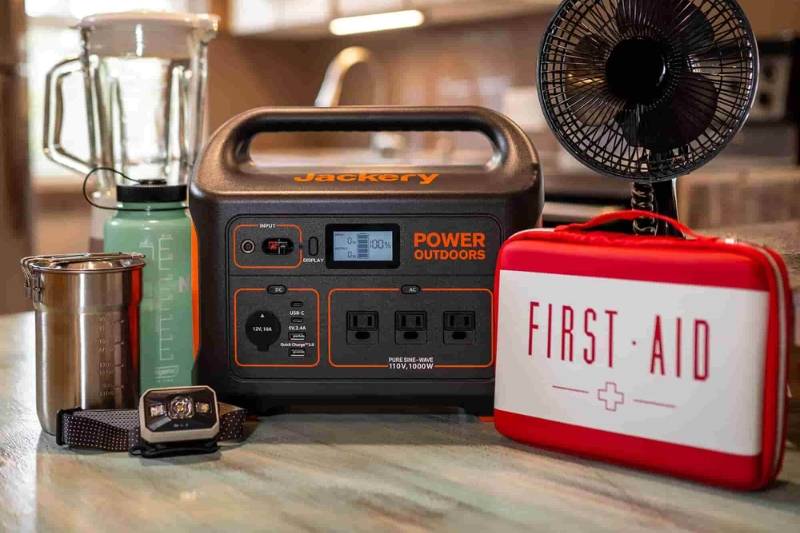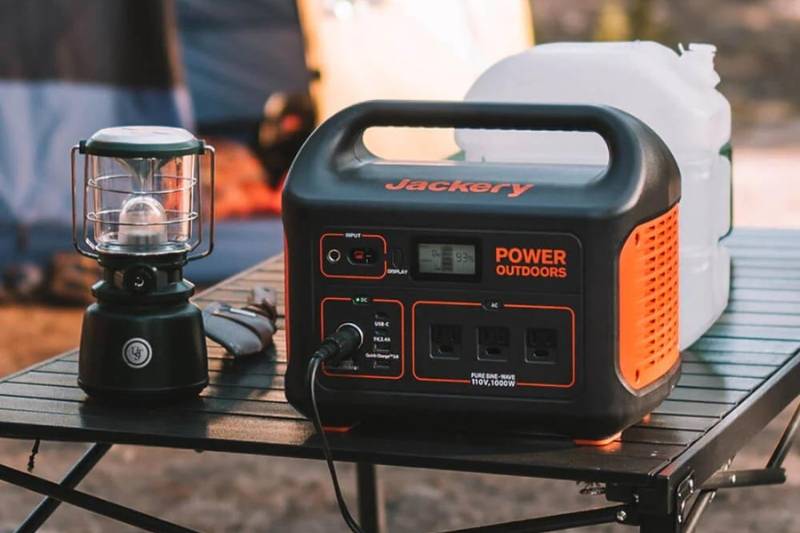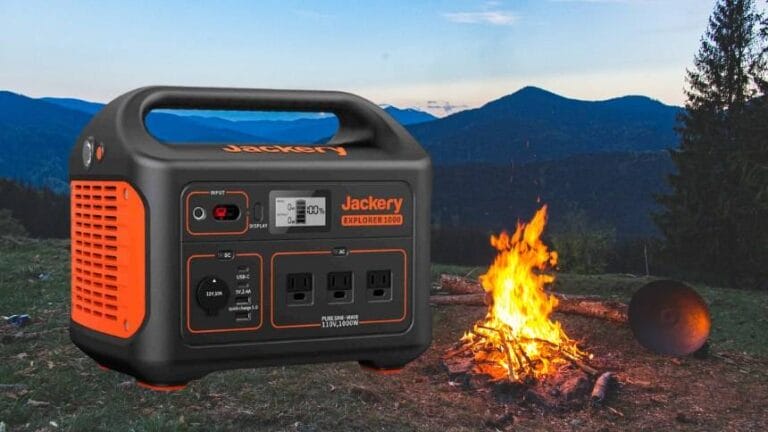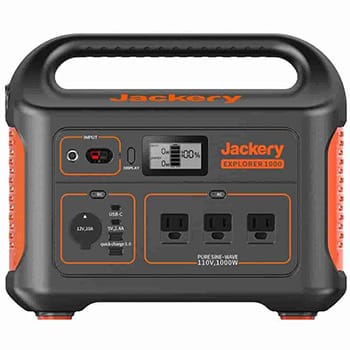The grid is getting shakier. Blackouts? More common. Climate anxiety? Sky-high. And let’s be real — gas generators are loud, smelly, and anything but green.
Enter the Jackery 1000 watt generator — a solar-powered beast built for modern resilience. Whether you’re camping off-grid, prepping for emergencies, or just want to keep your blender humming during a blackout, this generator offers clean, portable power without the guilt.
But the Jackery 1000 isn’t just a one-hit wonder. It’s part of a bigger push — a growing lineup of solar generators designed to make renewable energy accessible for everyone. And behind it all is Jackery, a brand claiming to champion sustainability while shipping sleek orange power boxes to adventure seekers and eco-minimalists alike.
So, does the Jackery 1000 watt generator actually live up to the hype? And is Jackery truly walking the green talk — or just riding the solar wave?
Let’s plug in and find out.
How Sustainable Is Jackery? A Look at the Brand’s Green Commitments
Jackery doesn’t just build solar generators — it markets itself as a pioneer in clean, portable energy. But how green is the brand behind the orange box?
For starters, Jackery claims to be committed to sustainable energy innovation. The company introduced its first solar generator in 2015 and has since expanded its product line to support off-grid living, emergency preparedness, and outdoor adventures, all powered by the sun. Their generators and solar panels aim to replace noisy, fossil-fuel-hungry machines with quiet, zero-emission alternatives.
In 2022, Jackery became the first portable power brand to be awarded TÜV SÜD’s Carbon Footprint Verification — a move that adds some credibility to its environmental claims. The brand has also emphasized RoHS-compliant manufacturing, meaning fewer toxic materials in their components, which is a big deal for product recyclability and environmental impact.
Jackery’s packaging is largely recyclable, and the company actively promotes reuse and responsible disposal of its products. However, critics argue that while the brand has taken steps toward sustainability, there’s still limited transparency on supply chain emissions, battery sourcing ethics, or take-back programs for end-of-life devices.
In short: Jackery is on the sustainability path, but like many tech-forward brands, it’s still catching up on full-circle accountability. The Jackery 1000 watt generator might be solar-powered, but consumers who care about planetary impact should look beyond watts and watt-hours — and into how the brand’s sustainability efforts stack up long-term.
What to Know About the Jackery 1000 Watt Generator
The Jackery Explorer 1000 — commonly known as the Jackery 1000 watt generator — has earned a loyal following in the world of portable solar power. Touted as a lightweight yet powerful solution, it’s built for people who need clean, reliable energy without the noise or fumes of a traditional gas generator.
But beyond the marketing hype, how does it actually perform?

Power Capacity That Hits the Sweet Spot
At the core of the Jackery 1000 is a 1002Wh lithium-ion battery, capable of delivering 1000 watts of continuous power and 2000 watts at peak surge.
This gives it enough juice to run small appliances like a mini fridge, coffee maker, or blender, as well as essential devices such as laptops, lights, medical equipment, or communication gear.
It’s a versatile system that serves both off-grid adventurers and homeowners facing unexpected outages.
Multiple Output Ports for Modern Devices
The generator includes three pure sine wave AC outlets, two USB-C ports, two USB-A ports, and a 12V carport — all built to support simultaneous charging.
Whether you’re powering your camera, phone, or running a CPAP machine overnight, the Jackery 1000 watt generator delivers consistent, stable electricity that’s safe for sensitive electronics.
Solar-Ready and Easy to Recharge
The Jackery 1000 is fully compatible with the brand’s SolarSaga 100W panels, allowing users to recharge using solar energy in about 6–8 hours with ideal conditions and dual panels.
Wall outlet charging takes approximately 7 hours, and car charging takes a bit longer. Its built-in MPPT charge controller optimizes solar efficiency, making it a practical solution for people living off-grid or traveling long-term.
Lightweight, Portable, and User-Friendly
Weighing just around 22 pounds, this solar generator is incredibly portable for its capacity. The molded handle and compact design make it easy to carry, store, or slide into an RV cabinet.
The bright LCD screen displays real-time input, output, and battery status, simplifying power management for users with no technical background.
Designed for Everyday Reliability
From weekend getaways to emergency backup power, the Jackery 1000 watt generator is designed to show up when you need it.
Its durable build, quiet operation, and intuitive interface make it beginner-friendly — without skimping on performance for experienced users.
Pros and Cons of the Jackery 1000 Watt Generator
Pros
Cons
- Clean and quiet solar-powered operation
- Lightweight and easy to transport
- 8 versatile output ports for multiple devices
- Pure sine wave inverter protects sensitive electronics
- Compatible with Jackery solar panels for off-grid use
- Intuitive LCD screen and simple interface
- Slower charging speed with a single panel
- No expandable battery capacity
- Lacks app control or smart features
- On the pricier side compared to wattage
Jackery’s Solar Generator Lineups: How the 1000 Stacks Up
Jackery doesn’t just make one solar generator — it offers a full lineup that ranges from compact emergency backups to full-blown off-grid power stations. The Jackery 1000 watt generator sits right in the middle, offering a sweet spot between portability and performance.

Explorer 240 and Explorer 300: Entry-Level Essentials
These lower-capacity models are built for ultra-portability. The Explorer 240 is ideal for charging phones, tablets, and small LED lights — perfect for short camping trips or emergency kits. The Explorer 300 adds USB-C ports and faster charging, but both are best suited for light-duty use.
Explorer 500: A Modest Power Boost
The Jackery 500 offers a bump in power capacity while maintaining excellent portability. It can handle small appliances, laptops, and CPAP machines — making it a popular option for RV travelers and weekend campers. However, it lacks the surge capacity and AC port volume of the 1000.
Explorer 1000: The Versatile Mid-Tier Workhorse
This is where flexibility and power meet. The Jackery 1000 watt generator offers enough wattage to run a mini-fridge, blender, fan, or multiple devices at once. It’s ideal for extended camping trips, power outages, and small cabins — without tipping into the bulky high-end range.
Explorer 1500 and Explorer 2000 Pro: Heavy-Duty Backup Solutions
For users who need serious power, these upper-tier models like the Jackery 200 Pro offer expanded capacity, faster solar charging, and support for larger appliances like microwaves, pressure cookers, or power tools.
In fact, their Jackery 3000 Pro is simply a behemoth.
They’re designed for long-term backup and partial home use, but they’re heavier, pricier, and less portable.
Is Jackery Right for You? Best Use Cases and Real Users
The Jackery 1000 watt generator isn’t a one-size-fits-all machine — and that’s a good thing. It hits a sweet spot that makes it incredibly versatile for a range of users who need dependable, clean energy on the go or in an emergency.
Outdoor Enthusiasts and Campers
If you love getting off the grid — but not off the internet — the Jackery 1000 is built for you. It powers mini-fridges, LED lights, smartphones, drones, and even portable coffee makers. Lightweight enough to haul around, yet powerful enough to keep essentials running, it’s a favorite among van-lifers, car campers, and overlanders.
Emergency Preparedness at Home
The Jackery 1000 is a popular choice for backup power during blackouts and natural disasters. It can keep your phone charged, run a CPAP machine overnight, and even power small appliances to keep your food from spoiling. Unlike gas generators, it can be used safely indoors, with zero emissions or noise.
Remote Workers and Digital Nomads
For those working remotely from cabins, boats, or road trips, this generator provides reliable electricity for laptops, Wi-Fi hotspots, monitors, and chargers. It’s especially helpful in areas with unstable grid power or no access to outlets.
Eco-Conscious Users Who Want Off-Gas Solutions
Many buyers simply want to ditch gas-powered generators for something greener. The Jackery 1000 watt generator offers a low-maintenance, sustainable alternative for those seeking to reduce their carbon footprint without sacrificing functionality.
Things To Consider Before Buying a Portable Solar Generator
What Power Capacity and Wattage Do You Need?
The capacity of the portable generator is the amount of power load it can take. It is measured in watts (W), which when applied to power usage translates to watt-hours (Wh).
The more watts, the more appliances you can hook to your generator. You can find wattage for any divide on the sticker at the bottom.
What Charging Options Does It Offer?
A good portable generator should give you multiple charging options.
- Utility Grid — You simply plug one end of the cable with the inverter into the wall socket and the other end goes into the AC socket on the generator.
- Car charging is another option worth having. A 12V car adaptor plugs into the cigarette lighter socket so you can charge your generator on the go.
- Solar panels — Finally, if you really want to be independent of the grid and 100% eco-friendly, look for a generator you can charge with portable solar panels.
Can It Charge Different Devices at Once?
The earliest portable generators had only regular 110V outlets because back in the day, there was little to plug in other than a camping lamp, hot plate, and perhaps a radio.
But now a portable generator features multiple USB-A, USB-C, and AC outlets. Some generators can even charge car devices that use the 12V cigarette lighter plug.
How Durable Is It?
Although many products are advertised as “portable,” not all generators are sturdy enough for you to haul them with your camping gear.
Look for a product with quality plastic housing that can take some abuse.
Frequently Asked Questions (FAQ)
Yes, a 1000 watt generator can run a refrigerator if the starting wattage is under 1000 watts. A refrigerator has a much lower running wattage but will suck up more power at startup because of the electric motor.
You need five or seven 1000 watt inverter generators to run your house. A home of average size needs between 5000 and 7000 watts to power the essential appliances and lighting. In an emergency, you’ll only want to run the most essential equipment, so in reality, one or two generators will do the job.
Yes, a 1000W generator will run a space heater up to 750 watts. Most space heaters run on 1500 watts but have a lower power 750 watts setting.
No, a 1000W generator won’t run an air conditioner. Even if you have a modest 30-amp air conditioner, you need a generator with at least 14000 running watts.
A 1000W generator can run lights, laptop and desktop computers, a coffee maker, small fridge, flat-screen TV, dishwasher, blender, slow cooker, portable fan, and even some power tools.
Final Verdict: Is Jackery a Brand You Can Trust?
In a growing market of solar generator brands, Jackery has carved out a solid reputation — not by offering the flashiest features, but by delivering reliable, user-friendly power solutions that just work. The Jackery 1000 watt generator sits at the heart of that promise: a clean, quiet, and capable source of portable energy that covers most everyday needs without overwhelming the average user.
From emergency backup to off-grid adventures, the Explorer 1000 provides a balanced mix of performance, portability, and sustainability. Sure, it lacks some of the high-end features found in competitors — like expandable batteries or smart connectivity — but what it delivers is peace of mind in a box: power when and where you need it, with minimal fuss.
And while Jackery’s sustainability claims aren’t without room for growth, the brand is clearly leaning into the renewable energy movement with purpose and momentum. For most people seeking a dependable, solar-ready generator from a proven brand, Jackery remains a trustworthy choice.
If you’re looking for a solar generator that’s easy to carry, simple to use, and powerful enough to handle real-life scenarios — the Jackery 1000 watt generator is well worth considering.




